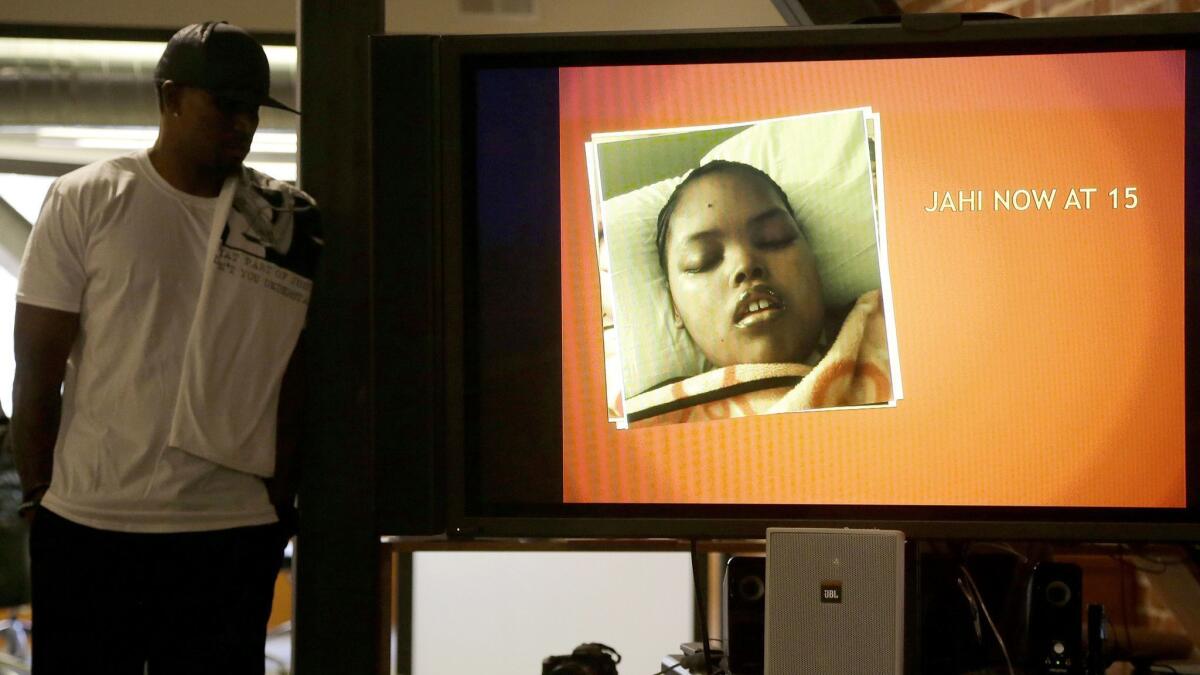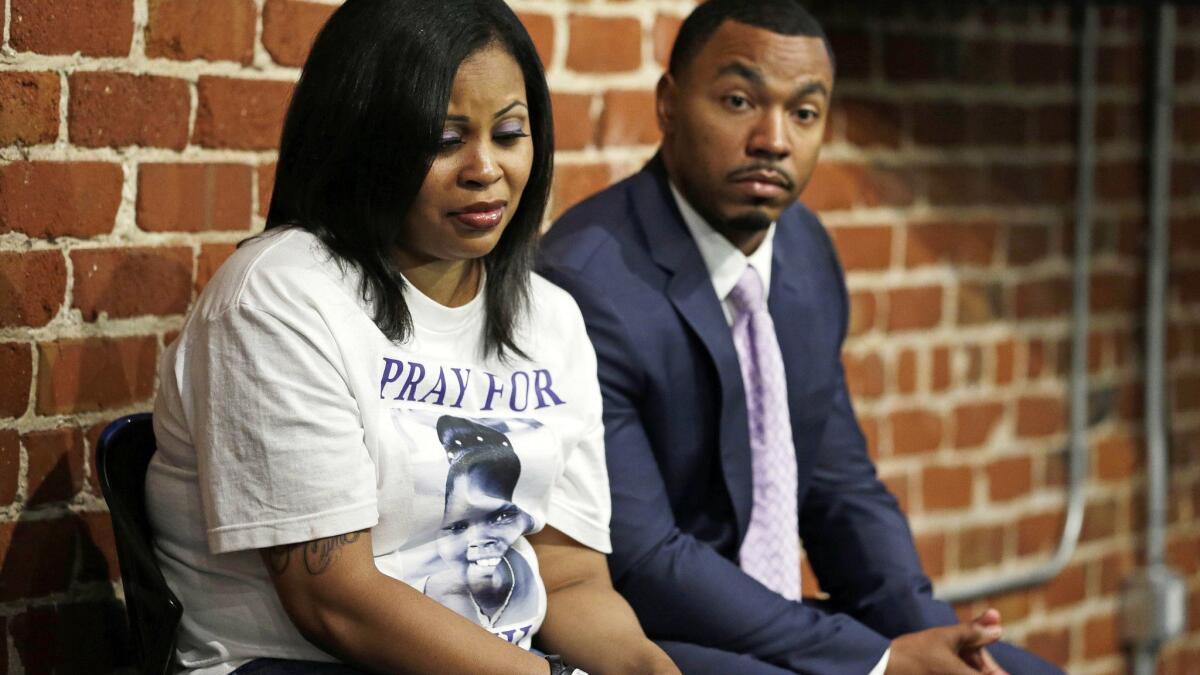Jahi McMath, girl at center of debate over brain death, dies, mother says

- Share via
In the years since Jahi McMath was declared brain dead, she sometimes showed signs of life: a twitch of her finger, the wiggling of a toe.
Those moments, and their Christian faith, invigorated Jahi’s family in their fight to keep the girl on life support.
“Jahi wasn’t brain dead or any kind of dead,” her mother, Nailah Winkfield, told the Associated Press. “She was a girl with a brain injury, and she deserved to be cared for like any other child who had a brain injury.”
Years after the legal standoff to keep her on a ventilator, the Oakland girl died late last week when an operation to treat an intestinal issue led to excessive bleeding and liver failure, Winkfield said. Jahi died in New Jersey, which accommodates families whose religious beliefs don’t recognize brain death.
A man who identified himself as Jahi’s stepfather said Winkfield was having a tough time and was unavailable for further comment. He also declined to comment.
Jahi’s case, which drew national attention and launched a debate over how to define death, began in December 2013 when the 13-year-old underwent a routine surgery to remove her tonsils, adenoids and uvula. She was declared brain dead three days later after she went into cardiac arrest and suffered extensive brain hemorrhaging.
At the time, at least three neurologists confirmed that Jahi was unable to breathe on her own, had no blood flow to her brain and had no sign of electrical activity. The Alameda County coroner issued a death certificate.
Her family was allowed in early 2014 to remove her from the hospital on a ventilator and, after they raised money for a private jet, flew her to a Catholic hospital in New Jersey. She later received care at a New Jersey home.
That year, her family released a video of Jahi moving her foot, her toenails painted, at her mother’s urging. Jahi was wrapped in a butterfly blanket, a Mother’s Day poster hanging behind her bed.
Last year, Dr. Alan Shewmon, a retired UCLA neurologist and well-known critic of diagnosing brain death, said in court documents that Jahi’s body had not deteriorated as expected. He said videos showed Jahi twitching her fingers and reacting to odors.

Jahi’s family had sought to reverse her California death certificate as part of a medical malpractice lawsuit filed against Children’s Hospital in Oakland. Relying on Shewmon’s statements, a judge last year ruled that it was up to a jury to determine whether the girl was still alive.
To move from Oakland to New Jersey, Winkfield left her job, sold her home and temporarily had her family members care for her other children, the Bay Area News Group reported. Every day, the girl’s mother would “wash her, comb her hair, do her nails, watch TV and explain what was going on,” the news group reported.
“I’m devastated about losing my daughter,” Winkfield told the news agency. “Everything I did revolved around Jahi.”
The New Yorker reported that before Jahi had her tonsils removed, she peppered her doctor with questions, asking him how many times he’d done the surgery and if he slept enough the night before. Winkfield told her daughter to continue asking questions. “It’s your body,” she had said, the New Yorker reported. “Feel free to ask that man whatever you want.”
Christopher Dolan, the family’s attorney, told the Bay Area News Group that Jahi’s body will be taken back to Oakland next week. Her brain will be preserved for scientists to study. He did not immediately respond to a request for further comment.
It’s unclear whether Jahi’s family will continue their legal fight moving forward.
The Associated Press contributed to this report.
UPDATES:
9:25 p.m.: This article was updated throughout with staff reporting.
This article was originally published at 6:20 p.m.
More to Read
Sign up for Essential California
The most important California stories and recommendations in your inbox every morning.
You may occasionally receive promotional content from the Los Angeles Times.
![Vista, California-Apri 2, 2025-Hours after undergoing dental surgery a 9-year-old girl was found unresponsive in her home, officials are investigating what caused her death. On March 18, Silvanna Moreno was placed under anesthesia for a dental surgery at Dreamtime Dentistry, a dental facility that "strive[s] to be the premier office for sedation dentistry in Vitsa, CA. (Google Maps)](https://ca-times.brightspotcdn.com/dims4/default/8c153ef/2147483647/strip/true/crop/2010x1344+32+0/resize/320x214!/quality/75/?url=https%3A%2F%2Fcalifornia-times-brightspot.s3.amazonaws.com%2F78%2Ffd%2F9bbf9b62489fa209f9c67df2e472%2Fla-me-dreamtime-dentist-01.jpg)










